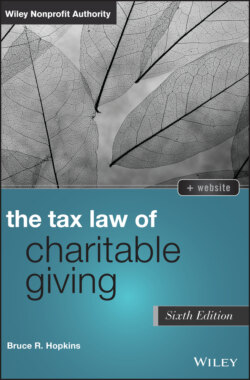Читать книгу The Tax Law of Charitable Giving - Bruce Hopkins R., Bruce R. Hopkins, David Middlebrook - Страница 37
(m) Mandatory Payments
ОглавлениеThe concept of the mandatory contribution has an oxymoronic ring to it, and for good reason, in that deductible charitable contributions are generally required to be voluntary.249 Yet there are transfers to charitable organizations that are mandated by law, court order, contract, or even the charitable entity itself.250 Intermixed with this topic is another general rule, which is that deductible contributions are often expected to be supported with donative intent.251
An illustration of a mandatory payment to a charitable entity was the dedication of a parcel of land by an individual to a county for use as a public street; the transfer was disallowed as a charitable contribution because the individual was obligated by contract to sell the land to a church.252 Similarly, an individual was not allowed to deduct a sum paid to fill a gully in a city street, inasmuch as the payment was made in compliance with an order issued by the city.253 Likewise, a payment made to a tax-exempt retirement home to reserve a room for the payor or a relative of the payor was not a deductible charitable gift.254 Further, a seller of a home in conjunction with a down payment assistance program conducted by a nonprofit organization, who was obligated to make a “contribution” to the organization in an amount equal to the down payment grant provided by the organization to the purchaser of the home, was advised by the IRS that payment was a fee for service and not a deductible contribution.255 Moreover, payments made by a company to various public charities in order to comply with rules of a governmental entity, where failure to make the payments could jeopardize the company's continued business operations, were ruled by the IRS to not be deductible as charitable gifts.256 A court ruled that a transaction “bears the classic feature of a quid pro quo exchange,” where a grant of an easement (claimed as a gift) was required to enable the “donors” to obtain permission from a county to sell their development rights with respect to the underlying property.257
Further still, a donor of a façade easement was not allowed a charitable deduction for a fee paid to the donee public charity because it was cast by the trial court as a quid pro quo payment; the return benefit was said to be the value of the assistance provided by the donee to the donor in facilitation of the contribution.258 This decision was reversed, with the appellate court holding that the charity did not provide the donor with anything of value in return for her money gift.259 The court saw the cash gift as an endowment of the maintenance of the easement, with the two gifts constituting an “unrequited contribution.”260 The court said that the donor's desire to obtain tax deductions for her gifts did not involve anything provided by the donee. As the court stated, if the “motivation to receive a tax benefit deprived a gift of its charitable nature . . . , virtually no charitable gifts would be deductible.”261
By contrast, when the payor has a choice or an election to make, a payment to a charitable organization can constitute a charitable gift. Thus, when a charitable organization required participants in a group insurance plan to assign dividends to it as a condition of continued participation in the plan, the payments were held to be nondeductible.262 Subsequently, however, the plan terms were amended to make refund of the dividends an easy-to-exercise option; the IRS ruled that the payments to the charitable organization under the revised circumstances were deductible as charitable gifts.263
In analogous circumstances, credit card holders voluntarily elected to contribute rebates generated by their credit card purchases to charitable organizations. The IRS ruled that the payments were deductible as charitable gifts.264 Likewise, when a “sponsorship gift” was requested, but not required, in connection with admission to an exempt retirement home, the payment was considered to be a deductible charitable gift.265
The Supreme Court observed that a payment proceeding from the “constraining force of a moral or legal duty” is not a charitable gift.266 This principle was applied by a court in concluding that a portion of the amount paid to an educational society was in the nature of fees for tuition in connection with education of the payors' children, and thus was not a charitable contribution.267
